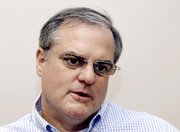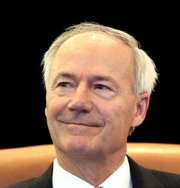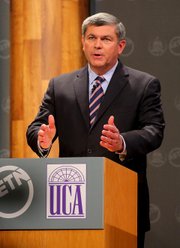More than $7 million in campaign donations flowed into Arkansas' U.S. Senate contest between incumbent Democrat Mark Pryor and Republican Tom Cotton over the past 15 weeks.
Separately, the state's governor's race pitting Republican Asa Hutchinson and Democrat Mike Ross collected about $900,000 in September alone.
State and federal laws say the donors' names are public information. But it's impossible -- or at least impractical -- for voters and researchers to learn who the contributors are. It's particularly true now, just days before the Nov. 4 general election.
That's because candidates for the U.S. Senate and for all Arkansas political races are allowed to file their campaign finance reports as stacks of paper. Those hard-copy reports take weeks or months to convert into modern computer database programs.
That means the donors' names behind millions of dollars in recent campaign donations won't be available, or widely usable, until after voters go to the polls.
Paper filings aren't allowed for other federal races, including for president and for the U.S. House. Most other states require electronic rather than paper campaign finance reports, especially in statewide campaigns.
Filing paper reports is an outdated and wasteful practice, according to campaign finance overhaulers.
"It costs the government hundreds of thousands of dollars in taxpayer money each year to enter the Senate candidates' paper records into digital databases," according to the nonprofit Center for Responsive Politics in Washington. "Thankfully, some lawmakers are trying to change this."
Pryor's U.S. Senate campaign, for example, has filed more than 3,000 pages of hard-copy campaign finance information since July 1, according to paper documents filed with the Federal Election Commission in Washington.
Cotton's campaign has filed more than 2,000 pages.
Voters who want to see who's behind that money would have to flip through the pages on the commission's website, www.fec.gov.
Last week, the commission posted a notice on its online campaign finance disclosure portal that highlighted the problem:
"Unusually large paper reports filed by U.S. Senate candidates in the third quarter of the current cycle have overwhelmed our processing capacity, slowing public disclosure of those reports. Total page numbers far exceed all previous election cycles, and the Senate Public Records Office is continuing to process and forward additional campaign reports to the Commission. We regret the delay and are taking urgent action to publish copies of all Senate reports as quickly as possible."
As for Arkansas, the state ranks among the last handful that still allow paper filing for statewide races, a Democrat-Gazette review found earlier this year.
Electronic filing is optional. But the bigger and more expensive the race, the fewer the candidates who file through the optional electronic system, the newspaper's review found.
This year, Democratic and Republican candidates for governor, lieutenant governor and attorney general in Arkansas have filed only paper campaign finance reports, according to the secretary of state's website.
Gubernatorial candidates Ross and Hutchinson, for example, filed more than 340 pages in September, according to the site, www.sos.arkansas.gov.
Paper reports for Arkansas candidates also don't necessarily appear on standardized forms. The donors' names don't have to be listed alphabetically or in any particular order. In some cases, the pages aren't even numbered.
Arkansas "has fairly good disclosure laws," said professor of politics Jay Barth of Conway's Hendrix College. "But the problem is the state makes the information so difficult to track."
Hal Bass, a political science professor at Ouachita Baptist University in Arkadelphia, said, "Campaign finance reformers have long sought more transparency and immediacy" in connection with candidates' contribution reports. "The system hasn't responded very well."
Contributions examined by the newspaper were sent directly, or through conduit groups, to the candidates' campaigns and are considered public records.
The newspaper's review didn't include millions of dollars more in so-called dark-money spending by nonprofit groups outside the campaigns that don't have to reveal their donors.
Even the hard-money public contributions can be staggering. Pryor's and Cotton's campaigns report raising more than $11 million each in total contributions for their U.S. Senate contest.
In the governor's race, Ross reports a total of $6.2 million, Hutchinson $3.8 million.
Transparency
The last monthly campaign finance report for statewide candidates before the election was due in Arkansas on Oct. 15, covering contributions and spending from Sept. 1 through Sept. 30.
Unlike those in some other states, Arkansas election workers don't themselves convert paper campaign finance reports into searchable computer databases.
If that conversion happens, it's left to nonprofit groups like the National Institute on Money in State Politics in Helena, Mont. The institute pays contract workers to review and study contributions to candidates from all 50 states. For states like Arkansas that still use paper copies, institute workers key the information into a searchable database. But that takes time and money.
Asked on Oct. 16 when the Arkansas governor's race contributions for September would be converted to a usable computer format, chief researcher Pete Quist replied, "It will likely be at least four weeks before this most recent report appears on our site. They're fairly large, so they'll take some time to go through our processes."
There are arguments for and against making campaign contributions easily accessible to the public, said Ouachita Baptist's Bass.
The argument for transparency "has to do with accountability, so voters and interested people can know who's backing whom, and who's getting what in return for their backing," he said.
But there are privacy concerns as well, "particularly among the folks who give the big dollars," he said. "There's a desire not to call attention to themselves, in the public spheres, at least."
Privacy advocates argue that they should be able to give anonymously, Barth said, because there can be social costs to supporting unpopular causes. And sometimes, those on the other side, "who say disclosure is the way to go, don't follow up."
The Democrat-Gazette asked gubernatorial candidates Hutchinson and Ross last week if they favor changing the state's laws to require electronic campaign finance filing.
In a telephone interview Friday, Hutchinson said he would "absolutely support more transparency and a requirement for filing campaign reports for statewide candidates in electronic form."
"Reporting on contributions by candidates is very important," he said. Electronic filing especially helps researchers. "The public can't be expected to do the searches on their own."
Filing campaign finance data is no simple matter for candidates, he added. Campaign workers have to verify information and make phone calls to donors.
Filing electronically might be too burdensome for smaller races, but not for better-financed statewide runs, Hutchinson said.
Until electronic filing is required, most candidates won't volunteer to make the change, he said.
"No one wants to give the advantage to the other side in the searchability of your own report," he added.
Ross campaign spokesman Brad Howard said in an email that his candidate "supports common-sense reforms that make campaigns and elections more transparent and more accountable."
Howard didn't immediately respond to follow-up questions about whether that support specifically would include changing Arkansas law to require filing electronic campaign finance reports.
'Unacceptable'
The Federal Election Commission has required online filing for most candidates since 2001.
U.S. Senate candidates are exempt because of a loophole in federal law, experts say. They file their campaign finance reports with the secretary of the Senate, instead of directly with the election commission. And the senators are required only to deliver paper reports to the chamber's secretary. It can then take weeks for election commission workers to enter the information into usable computer databases.
A commission spokesman said last week that it likely will be about a month before Pryor's and Cotton's Oct. 15 reports, covering donations for the year's third quarter starting July 1, are available electronically.
"The absence of electronic filing for Senate candidates is a formula for continuing to keep the American people in the dark about campaign finance activities," according to a June 2013 letter to the U.S. Senate posted by the Citizens for Responsibility and Ethics in Washington. Other signers included the nonprofit groups League of Women Voters and Common Cause.
Requests for interviews with Pryor and Cotton campaign spokesmen were not immediately returned Friday.
Elisabeth MacNamara, president of the League of Women Voters of the U.S., did respond to the Democrat-Gazette's questions.
"It is ridiculous that the U.S. Senate essentially keeps the campaign money secret before the election by blocking electronic filing," MacNamara said through a spokesman.
"Informed voters are the cornerstone of democracy," she continued. "But without electronic filing by candidates, the voters can't know before the election who is paying for the campaigns. This kind of secrecy is unacceptable in a democracy."
SundayMonday on 10/26/2014





